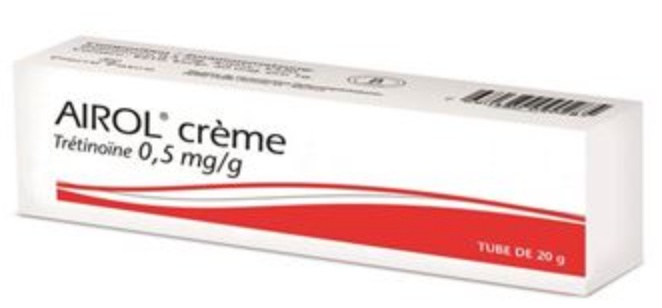
Ingredients overview
Warning: This ingredient list belongs to a topical product regulated as medicine and uses different ingredient listing rules than regular cosmetics. Read here for more detail.
Highlights
Alcohol Free
Fragrance and Essential Oil Free
Key Ingredients
Other Ingredients
Skim through
| Ingredient name | what-it-does | irr., com. | ID-Rating |
|---|---|---|---|
| Tretinoin (0.5 Mg) | cell-communicating ingredient | superstar | |
| Butylhydroxyanisole (E320) (X) | antioxidant, preservative | icky |
Airol cream 0.5 Airol CreamIngredients explained
Tretinoin (0.5 Mg) - superstar
Also-called: All-Trans-Retinoic Acid, Form of Retinoids |
What-it-does:
cell-communicating ingredient
- Tretinoin (a metabolite of vitamin A) is the gold standard anti-aging ingredient that is also FDA-approved (and it's the only one so far!)
- It's an all around skin issue fixer as it works at the skin cell level and makes your skin cells behave in a healthy and normal way
- It makes the skin less wrinkled, firmer, smoother and tighter, everything you could want from an anti-aging ingredient
- It's also an effective acne treatment. It normalizes keratinization and makes the pores produce less sebum
- It's also a skin lightener though not as effective as gold-standard hydroquinone.
- Side effects with tretinoin are very common. Irritation, skin flaking, redness, and drier skin are usual
- Do not use tretinoin (or any form of retinoids) while pregnant
- To minimize side effects introduce tretinoin slowly into your routine (see more how to use tips in geeky details)
Also-called: Butylated Hydroxy Anisole;BHA |
What-it-does:
antioxidant, preservative
It's the acronym for Butylated Hydroxy Anisole. It's a synthetic antioxidant that's used as a preservative.
It's a somewhat controversial ingredient: The U.S. National Institutes of Health says that BHA is "reasonably anticipated to be a human carcinogen based on evidence of carcinogenicity in experimental animals" (source: wikipedia). But, and this is a big but: these experiments were made on animals and BHA was used in high doses as part of their diet. There is no evidence that the same is true when used in tiny amounts in cosmetics products. So you probably have nothing to worry about, but if you are a better safe than sorry type there are plenty of nice products without BHA to choose from. :)
You may also want to take a look at...
| what‑it‑does | cell-communicating ingredient |
The gold-standard, and only FDA-approved anti-aging active ingredient. It works on the skin cell level and makes your skin cells behave in a healthy and normal way. It's not only an anti-aging miracle but is also an effective acne treatment and skin lightener.
[more]
| what‑it‑does | antioxidant | preservative |
It's the acronym for Butylated Hydroxy Anisole. It's a synthetic antioxidant that's used as a preservative.
It's a somewhat controversial ingredient: The U.S. National Institutes of Health says that BHA is "reasonably anticipated to be a human carcinogen based on evidence of carcinogenicity in experimental animals"
[more]





